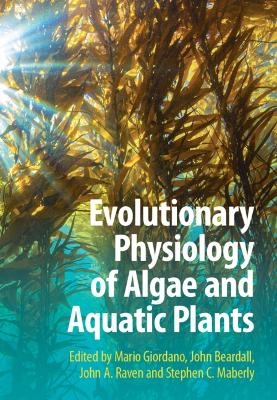
Evolutionary Physiology of Algae and Aquatic Plants
Cambridge University Press (Verlag)
978-0-521-82298-5 (ISBN)
- Noch nicht erschienen (ca. November 2024)
- Versandkostenfrei innerhalb Deutschlands
- Auch auf Rechnung
- Verfügbarkeit in der Filiale vor Ort prüfen
- Artikel merken
Photosynthetic organisms have an enormous influence on our environment through their effects on the development of other life on Earth and the way they alter the planet's geology and geochemistry. This book takes a unique approach by examining the evolutionary history of the major groups of aquatic photoautotrophs in the context of the ecophysiological characteristics that have allowed them to adapt to the challenges of life in water and thrive under past and present environmental conditions. The important role played by aquatic photoautotrophs on a planet undergoing unprecedented anthropogenic-induced change is also highlighted, in chapters on their critical function in mitigating environmental change through their physiological processes, and on the role of algae in biotechnology. This invaluable resource will be appreciated by researchers and advanced students interested in the biodiversity and evolutionary physiology of the full range of aquatic photoautotrophs, and their interaction with the environment.
Mario Giordano (1964–2019) was Professor of Plant Physiology at the Marche Polytechnic University, Ancona, Italy, where he founded a Plant and Algae Physiology laboratory focussing on the acquisition and metabolism of carbon, nitrogen and sulphur by alga. He was Professor at the Academy of Science of the Czech Republic and associate researcher at ISMAR-CNR, Venice. Mario was Director of the Joint Algal Research Center, JARC, between the University of Shantou in China and UNIVPM. He published over 120 journal articles and book chapters and received the Luigi Provasoli Award from the Phycological Society of America (2002). Shortly before his untimely death he had been appointed Scientific Attaché at the Italian Embassy in Beijing. John Beardall is Emeritus Professor at the School of Biological Sciences, Monash University, Melbourne. He is also Distinguished Visiting Professor at the Faculty of Applied Sciences, UCSI University, Kuala Lumpur, Malaysia, and Visiting Professor at the State Key Laboratory of Marine Environmental Science, College of Ocean & Earth Sciences, Xiamen University, China. His research has centred on the physiology of algae, focussing on the acquisition of inorganic carbon and the effects of climate change. He has published over 300 papers and book chapters and received the Luigi Provasoli Award (2002) and the PSA Award of Excellence (2018) from the Phycological Society of America. John A. Raven is Emeritus Professor at the Division of Plant Science, University of Dundee, UK. He is also Adjunct Professor at the School of Biology, University of Western Australia, and Visiting Professor at the University of Technology, Sydney. His research has focussed on the functioning of photosynthetic organisms, particularly aquatic photosynthetic organisms, in relation to their environment. He has published over 400 peer-reviewed papers and book chapters and was elected Fellow of the Royal Society of Edinburgh (1981) and Fellow of the Royal Society, London (1990). Stephen C. Maberly is a Fellow of the UK Centre for Ecology & Hydrology, Lancaster, UK. His research has included ecological studies of inland waters and their response to ecological pressures, and physiological experiments on the carbon acquisition mechanisms of their phytoplankton and macrophytes and also those of marine algae and seagrasses. He has published 180 papers and book chapters and 130 publications or reports for the general public and environmental managers. He received the Luigi Provasoli Award from the Phycological Society of America (1992).
List of contributors; Preface; Acknowledgements; 1. Environmental changes impacting on, and caused by, the evolution of photosynthetic organisms John A. Raven; Part I. Origins and Consequences of Early Photosynthetic Organisms: 2. Early photosynthetic organisms John A. Raven; 3. ….And nothing was the same anymore: the rise of O2 and consequences for photoautotrophs John Beardall, Mario Giordano and John A. Raven; 4. The appearance of eukaryotic microalgae Patricia Sánchez-Baracaldo and John A. Raven; 5. The appearance of macroalgae: evolution and ecological consequences of multicellularity Olivier De Clerk and Catriona L. Hurd; 6. The evolution of aquatic embryophytes: secondary colonisers of aquatic environments Stephen C. Maberly; Part II. Physiology of Photosynthetic Autotrophs in Present Day Environments: 7. Light as a major driver of algal physiology and evolution Ondřej Prášil, John Beardall and John A. Raven; 8. Temperature: still an enigmatic driver in the evolution and physiology of algae Christian Wilhelm and Heiko Wagner; 9. Nutrient acquisition by algae and aquatic embryophytes Antonietta Quigg and John A. Raven; 10. Salinity Ulf Karsten; 11. Desiccation Catriona L. Hurd; 12. Trait Trade Offs in mixoplankton: an analysis Aditee Mitra, Kevin J. Flynn, Diane Stoecker and John A. Raven; 13. Effects of pollution on algae Prachi Varshney and John Beardall; 14. Algae in extreme and unusual environments John Beardall and John A. Raven; Part III. The Future: 15. Aquatic phototrophs and the greenhouse effect John Beardall and John A. Raven; 16. Ultraviolet radiation effects under climate change Anita G.J. Buma, E. Walter Helbling and Michael Y. Roleda; 17. Variation in nutrient availability for aquatic phototrophs and its ecological consequences Stephen C. Maberly; 18. Algae: New products and applications Michael A. Borowitzka; Index.
| Erscheinungsdatum | 13.08.2022 |
|---|---|
| Zusatzinfo | Worked examples or Exercises |
| Verlagsort | Cambridge |
| Sprache | englisch |
| Themenwelt | Naturwissenschaften ► Biologie ► Botanik |
| ISBN-10 | 0-521-82298-X / 052182298X |
| ISBN-13 | 978-0-521-82298-5 / 9780521822985 |
| Zustand | Neuware |
| Haben Sie eine Frage zum Produkt? |
aus dem Bereich


